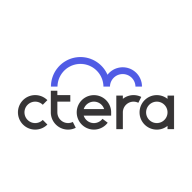

Find out in this report how the two Content Collaboration Platforms solutions compare in terms of features, pricing, service and support, easy of deployment, and ROI.
Adding SSD storage to Windows file servers is expensive, and we no longer need to back up those devices.
I am positive that CTERA has helped reduce the total cost of ownership by eliminating the need for manual storage management and reducing storage service processes.
They swiftly address concerns and take ownership of the call, providing a very satisfactory support experience.
High-priority issues are handled promptly.
I would rate their support a ten out of ten.
If we need to upgrade CPU and memory, we should be able to do that without a license upgrade.
CTERA is a very scalable product, allowing us to grow.
It offers good scalability options, including vertical and outward scalability.
It has been pretty stable since then.
We had things deployed for years, and we were suddenly getting cloud sync issues that were crashing our sites.
It is very stable and reliable.
AI and automation features could enhance the platform, such as AI-powered search, predictive storage analytics, and intelligent alerts for proactive monitoring.
It would help to have a global single-pane-of-glass view of all my CTERA devices.
One suggested improvement for the CTERA Enterprise File Services Platform is the ability to distribute data across multiple active backend storage nodes rather than the current limitation of a single active node.
Unlike other solutions that require hardware purchases, CTERA offers software licensing with flexibility across multiple infrastructure providers.
CTERA's pricing seems to be on par with some of the other players, such as Nasuni and Azure.
I find the pricing reasonable.
As soon as something is written to the device, CTERA copies it to the cloud, where it's versioned with snapshots so we can recover it.
A vital advantage of this platform is its instantaneous recovery capability, allowing seamless access to a secondary gateway if the primary one fails.
It is a three-in-one solution for us. It is a file-sharing platform, an archiving solution, and also a backup solution.


The CTERA Enterprise File Services Platform provides a cloud-native global file system over public and private object storage, revolutionizing the world of hybrid cloud data solutions. Enhanced by a rich data services ecosystem, CTERA enables enterprises to gain full control of their data for optimal edge performance, data insight, and governance. The platform focuses on security, providing features like data encryption, access controls, and ransomware protection. Centralized management tools enable efficient data control and monitoring. The platform is being used to replace legacy NAS and file servers, especially at remote locations, and simplify backup and disaster recovery of file data while providing the flexibility of multi-cloud deployments with infinite scalability. CTERA is at the core of hybrid cloud transformations of some of the world’s largest banks, healthcare organizations, global media groups, and government agencies, in deployments that scale to tens of petabytes.
ShareFile is widely used by organizations for secure emailing of tax returns and document transfers, especially during COVID, supporting multifactor authentication and a high file size limit.
Offered by cloud service providers, ShareFile aids in migrating on-premises file servers to the cloud and sending large files blocked by other platforms. It is essential for secure data sharing with features like multifactor authentication and encryption. ShareFile integrates with cloud services, supports high-speed operations, and maintains enterprise-level security with automatic synchronization. It also allows for multiplatform accessibility, including an Outlook plugin and mobile apps. Administrative benefits include Active Directory integration for automatic account creation.
What are ShareFile's most important features?ShareFile is implemented across sectors like Law Firms, CPAs, and Manufacturing companies, supporting secure and efficient data sharing. For example, law firms use it for confidential client documents, CPAs rely on it for secure tax return handling, and manufacturing firms leverage it for transferring large design files. Multifactor authentication and platform accessibility ensure data security and ease of access.
We monitor all Content Collaboration Platforms reviews to prevent fraudulent reviews and keep review quality high. We do not post reviews by company employees or direct competitors. We validate each review for authenticity via cross-reference with LinkedIn, and personal follow-up with the reviewer when necessary.